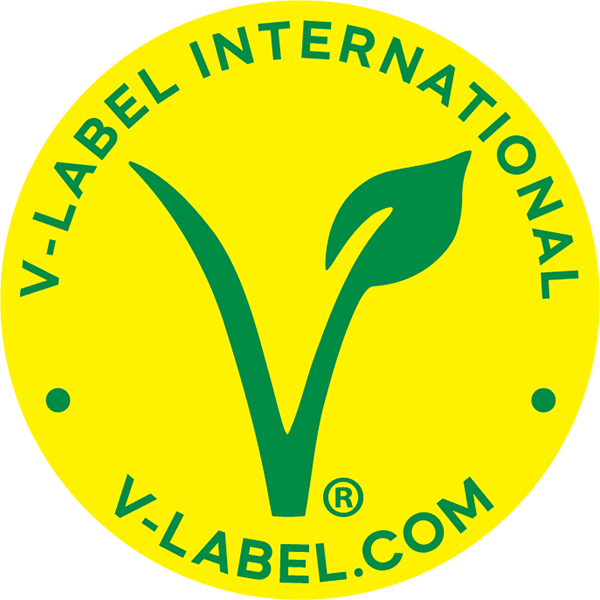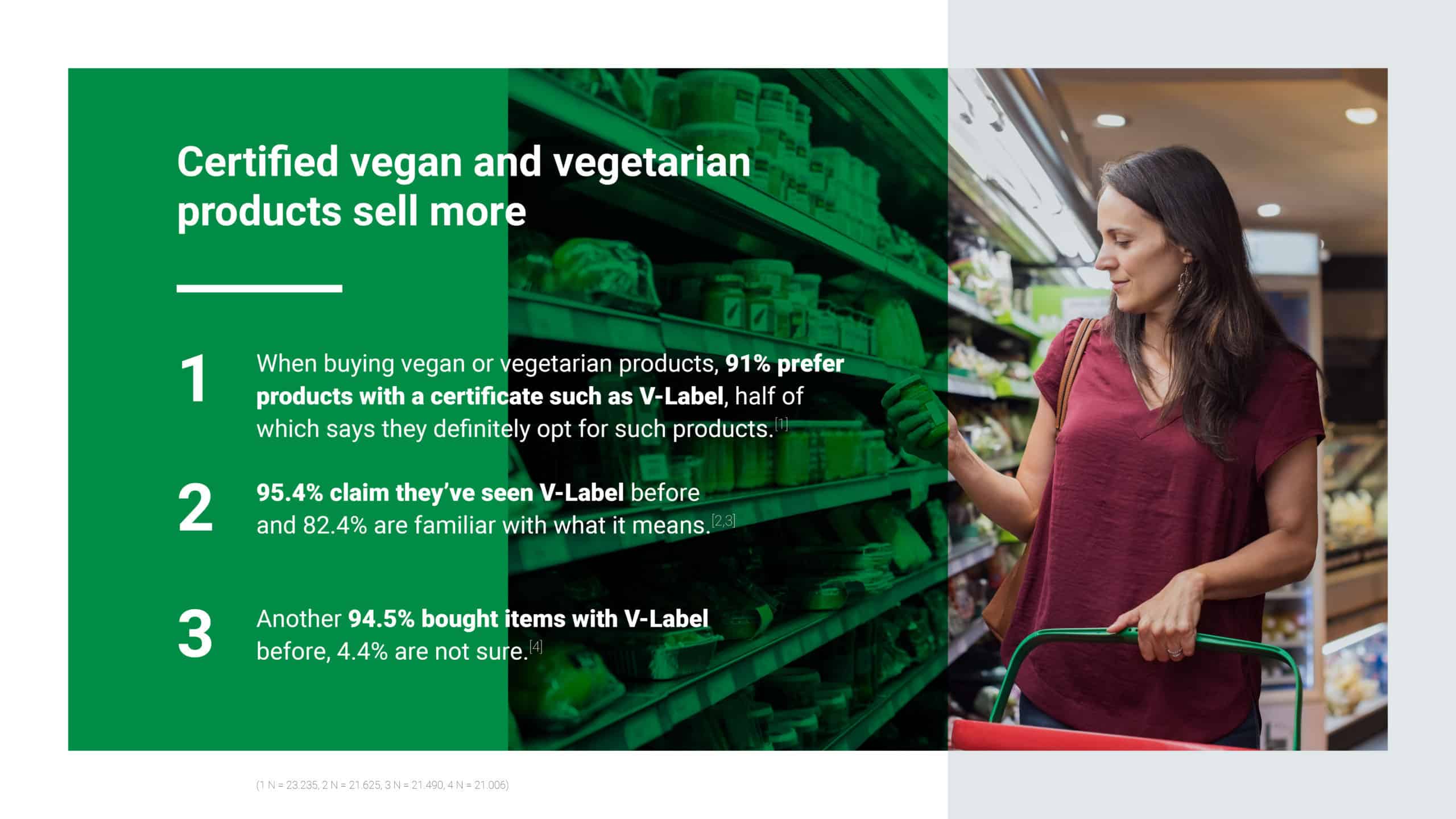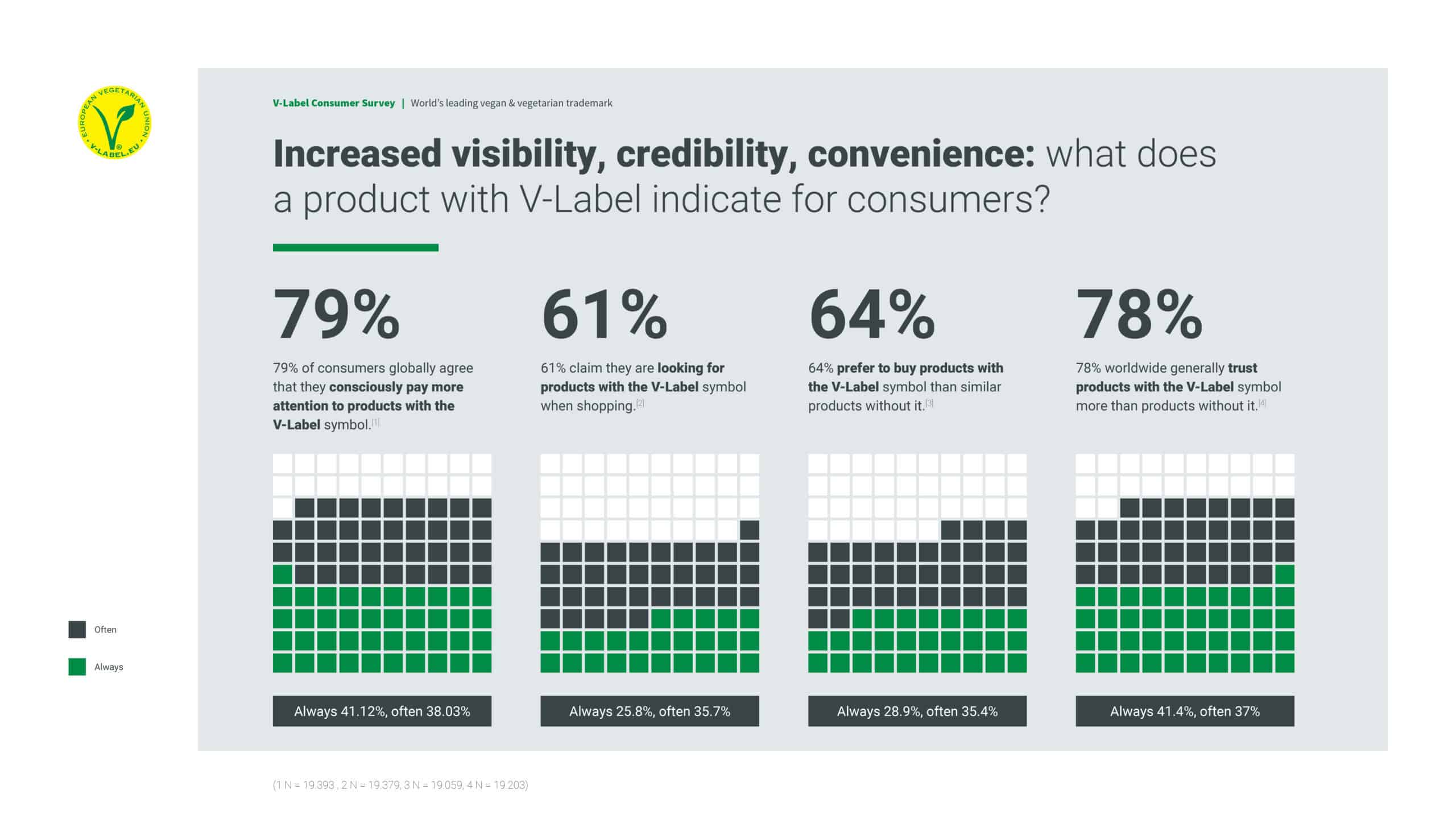Consumers increasingly rely on vegan food labels out of convenience, a survey by V-Label confirms
Millennials and Gen Z-ers make shopping decisions that largely depend on certifications and labels, a recent survey shows. V-Label conducted this survey on more than 23,000 consumers internationally, finding that 91% prefer products provided with an independent stamp guaranteeing the product is really vegan without having to read all ingredients list or spend time comparing and looking for alternatives. Half of responders said they definitely buy products marked with labels rather than ones without it.
According to a recent study from Smart Protein Project, “tremendous growth is visible across the plant-based sector in Europe. It grew by 49% over the last three years and is now up to 3.6 billion EUR.” While it is no secret that the current largest economically active segment, the millennials, drive the demand towards more environmentally conscious and socially responsible consumerism, they do so out of more than just love for the Earth. With way too many options in practically everything lifestyle-related, consumers actively look for ways to make life simpler: to identify healthy, vegan (or vegetarian) foods at a glance, without second-guessing their quality or undergoing decision fatigue. The fact that such convenience may come with a higher price tag is “a price” they are willing to pay.
When buying vegan or vegetarian products, 91% of respondents prefer products with a certificate such as V-Label, half of which say they definitely opt for such products. 79% of consumers globally agree that they consciously pay more attention to products with the V-Label symbol and 61% claim they are actively on the lookout for the V-Label sign on packaging. 78% generally trust products with the V-Label symbol more than products without it.
“Certified vegan and vegetarian products sell more because trust makes the sales. Brands can essentially say anything they want as a part of their marketing strategy, but when a product is verified as 100% vegan or vegetarian by an independent authority, it gains trust,” says Renato Pichler, CEO of V-Label GmbH.
When lingering, labels help make shopping decisions easier, saving both time and energy. Imagine this: you are in a grocery store, looking for plant-based ingredients for your dinner. Coming across products you’d like, what do you usually do? Start reading the list of ingredients? Looking at the section they’re in? Ask staff? None of this guarantees your product is 100% vegan (or vegetarian) through and through. When not sure the product is vegan, 92% of consumers would buy the product once they noticed it carries the V-Label symbol. Even more so, 52% would definitely buy it.
How much (more) are consumers willing to pay for a product that’s certified with a label?
“Around the world, 95% of consumers associate V-Label with higher credibility—either of the product or the brand itself (or both!). For almost half of consumers, there’s a direct correlation between V-Label and a higher quality or premium product,” Pichler adds to the survey findings. “Producers may benefit from existing trust consumers have towards V-Label, and, in this sense, V-Label goes beyond the simple recognition of whether a product is vegan or vegetarian and helps them stand out from increasingly full supermarket shelves.”
Similarly, more than a third of participants believe this goes hand in hand with higher price. The demonstrative part of our survey shows that consumers are willing to pay more for a product with the V-Label symbol than for the exact same product without it. When faced with a choice, 34% would buy a chocolate that costs 1.70 EUR as long as they saw the V-Label symbol, while only 24% would buy it if it had no label at all.
About the survey
The V-Label survey was conducted in April and May 2021. More than 23,000 consumers from more than 40 countries participated, with over 25% of applicants from the DACH region, 13% Polish, and 5% each from Spain, Portugal and the Czech Republic. More than half of the survey’s participants identified as mostly or fully vegan, every fifth eats vegetarian. Nearly two thirds of participants identified as female. 60% of participants were between 18 and 33 years of age, and over 70% possessed a high school or university degree.
About V-Label
Across the globe, more than 70,000 products from more than 4,800 licensees now carry V-Label. V-Label, established in Switzerland in 1996, is an internationally recognized, registered seal for labeling vegan and vegetarian products and services. It is a reliable, go-to shopping guide for consumers.

 Argentina
Argentina België (NL)
België (NL) Bosna i Hercegovina
Bosna i Hercegovina Brasil
Brasil Chile
Chile 中国
中国 Česká republika
Česká republika Colombia
Colombia Costa Rica
Costa Rica Danmark
Danmark Deutschland
Deutschland Ecuador
Ecuador España
España France
France Ελληνικά
Ελληνικά Hrvatska
Hrvatska Italia
Italia Lietuvių
Lietuvių 한국어
한국어 Magyar
Magyar Lebanon (EN)
Lebanon (EN) Melayu
Melayu Mexico
Mexico Nederland
Nederland Nigeria
Nigeria Norge
Norge Österreich
Österreich Perú
Perú Polski
Polski Português
Português Română
Română Русский
Русский Slovenčina
Slovenčina Türkçe
Türkçe South Africa
South Africa Suomi
Suomi Svenska
Svenska Schweiz
Schweiz Українська
Українська الامارات العربية المتحدة
الامارات العربية المتحدة Tiếng Việt
Tiếng Việt
